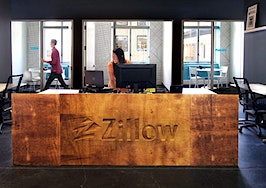- Zillow Group says more than 10 MLSs representing 180,000 agents have recently signed up for a listing input tool from its Bridge Interactive subsidiary, but that growth appears to be exaggerated.
During Zillow Group’s annual MLS Forum in Las Vegas this week, the real estate giant took the opportunity to announce that more than 10 multiple listing services with more than 180,000 agents combined had signed up for a listing input tool from its Bridge Interactive subsidiary, representing growth in its customer base.
10 more MLSs sign-on to use @ZillowGroup‘s Bridge technology for listings management. Momentous momentum. https://t.co/zdmnWwLbJ5
— Spencer Rascoff (@spencerrascoff) April 19, 2017
But whether these MLSs represent growth — and to what extent — for Bridge is unclear, as at least some of the “new MLS partners” the company touts are not actually new customers.
The announcement comes as competition gears up between real estate tech firms peddling listing management platforms — and their attendant efficiencies — to brokers and MLSs. In addition to Zillow Group’s Bridge, these products include UpstreamRE’s Upstream, CoreLogic’s Trestle, Black Knight’s Paragon for Brokers, Instanet Solutions’ Instanet Forms, and Realtors Property Resource’s Advanced Multilist Platform (AMP).
Adding to the conversation is the anticipated RESO (Real Estate Standards Organization) Web API update and the usefulness of adding MLSs to a tool that uses an older way of exchanging data between systems.
A blog post from Michael Wurzer, president and CEO of MLS system vendor FBS, calls into question the “hype” behind Bridge’s Compose tool, which he said is using an outdated data standard that could represent a waste of time and money should brokers, MLSs and tech vendors choose to implement it now.
Zillow Group points out, however, that the new standard is not yet available.
The ‘new’ MLS partners
Bridge’s Compose is a web application that allows brokers and agents to add and edit listings in a variety of systems, including multiple MLSs and brokerage back-office systems. This means agents and brokers are able to enter their real estate listings in Compose once and have them appear in the multiple MLSs they belong to — provided the MLSs adhere to a particular real estate data standard.
The MLSs that Zillow Group said had recently signed up for Compose include some big names:
- Northern Alabama Multiple Listing Service; Huntsville, Ala.
- Combined LA Westside MLS; Los Angeles, Calif.
- East Bay Regional, Data, Inc.; Oakland, Calif.
- Greater Fort Lauderdale Realtors; Ford Lauderdale, Fla.
- My Florida Regional MLS; Maitland, Fla.
- First Multiple Listing Service, Inc.; Atlanta, Ga.
- Georgia Multiple Listing Service; Atlanta, Ga.
- MLSPIN; Boston, Mass.
- NorthstarMLS; Minneapolis, Minn.
- MLSOK, Inc.; Oklahoma City, Okla.

Errol Samuelson
“We are pleased with the growing adoption of Bridge Interactive within the industry,” said Errol Samuelson, Zillow Group chief industry development officer, in a statement.
At this point, it is unclear how much of a growth bump these MLSs represent to Bridge, however. Zillow Group declined to say how many MLSs total had newly signed up for Bridge’s Compose, naming just these 10.
More than 35 MLSs are currently partnered with Bridge, according to the company. When Zillow Group first acquired Bridge in August, the company said it serviced a few more than 30 MLSs representing about 400,000 agents.
And some of the MLSs that have signed up for Compose — My Florida Regional MLS and Northern Alabama MLS, for instance — were already Bridge customers, but for a different product: Bridge’s Contact server for listing syndication, which allows MLS administrators to review real-time queries for listing content, number of listings accessed, and amounts of data requested.
In an email, Zillow Group said, “A few of the partners had leveraged other Bridge products in the past” but did not respond to a question asking exactly how many and which of the MLSs were already Bridge customers.
The company did admit that one of the MLSs mentioned in the release was already using Compose before Zillow Group purchased Bridge in August, but did not respond to a question asking which one.
Zillow Group declined to comment on when the MLSs mentioned in the release first signed up for Compose, saying, “We don’t discuss the specific of our partnerships.”
In a blog post titled, “Hyping Short-Term Tech Under The Gauzy Lights of Vegas,” FBS’s Wurzer said that including Georgia MLS and First MLS in Atlanta among Compose’s new users was “old news” because “I’m pretty sure [that] has been the case for about 10 years.”
Zillow Group said this was inaccurate and that GAMLS and FMLS “had just started using Compose” and were not using Compose in August.
GAMLS did not respond to a request for comment and FMLS said no one was available to say how long the MLS had been using the tool.
Included in Zillow Group’s announcement was a statement from Mike Canova, chief financial officer of the GAMLS: “We’re excited to be working with Bridge on our RETS Update project, and looking forward to bringing our members an efficient process for adding and editing listings in our market.”
A short-term solution?
But the thrust of Wurzer’s beef with Compose is the data standard it uses called RETS 1.8 Update, which, among other things, allows brokers to push listings to the MLS instead of the other way around. RETS Update was devised by RESO several years ago.
Compose will provide MLSs and their members with an “efficient single point of entry process,” Zillow Group said in its release.
“It provides agents who are in an area with multiple MLSs the ability to enter their listing one time and have it appear in multiple MLSs,” leading to “significant time and cost savings,” Samuelson told Inman via email.
“It allows MLSs to safely accept listings from outside their MLS vendor platform while still adhering to all individual MLS business rules.”
That brings “a more efficient listing input process to each market,” he added.

Michael Wurzer
But Wurzer said Compose is using an old data standard that will soon be replaced by a new RESO Web API Update standard that several industry entities are working together to create through RESO, including Upstream, Zillow Group, FBS, Black Knight, DocuSign, Redfin and other real estate tech vendors.
“Implementing both the old and the new update method at this stage simply wastes valuable time and energy and distracts everyone from the long-term solution,” Wurzer wrote.
“Zillow’s thinking is that because Compose is being used in Atlanta and a few other markets, they can use it to beat Upstream to the punch and corner the broker listing management market. But this strategy is a purely short-term play that benefits only Zillow and is a really bad idea for everyone else involved, especially MLS vendors like FBS,” he added.
“The reality is that there is no emergency here, no fire in the theater, and no reason to shove a short-term solution down the industry’s throat.”
Zillow Group not standing still
But Zillow Group pointed out that the new standard doesn’t exist yet and the company is trying to solve problems that exist now.
“Bridge Interactive uses current industry standards and will adopt new standards, as desired by the industry, as they become a reality,” the company said in an emailed statement.
“We know standards are a crucial to the industry — we’re a charter member of RESO, specialized in RETS, moved quickly to adopt the Data Dictionary and Web API standards.
“We will move Update to an API when the new standard is created. Currently, it does not exist, and may not exist for several years, and we are focused on helping the industry solve the current problem of listing data management through our innovative technology and the standards that are in place.”
‘It’s not about companies against companies’

Ryan Castle
For Ryan Castle, the CEO of Cape Cod and Islands MLS, who attended Zillow Group’s MLS Forum this week, making sure that his MLS is flexible enough to handle whatever brokers want it to do is most important — a goal he said he’s shared with his MLS vendor, Wurzer’s FBS.
“What I want to do is be able to integrate any product my brokers want to use. So if they want to use Upstream I want to be compatible with that. If they want to use Compose I want to be compatible with that,” Castle told Inman in an interview.
“I hope there’s going to be lots of different options out there and I want to be able to be responsive and nimble enough to be able to respond to what people want to do. ”
The problem with waiting for a new Update API standard is that “there’s a lot of people that aren’t comfortable that RESO will come out with standards in a timely fashion,” Castle said.
“The whole industry needs a clearer voice from RESO on what is the timetable for the standard for an Update API from them. Because ultimately standards are the issue that we’re talking about. It’s not companies against companies.”
New standard coming in months, not years
RESO CEO Jeremy Crawford has an answer for Castle and Zillow Group: the Update API specification will be available for MLSs, brokers and tech companies to implement by the end of the year.

Jeremy Crawford
The trade group is actively working on the API’s specs now, though it is dependent on the efforts of volunteers who work for the above-mentioned companies and therefore it is difficult to give delivery timelines, Crawford told Inman in an interview.
“The specification will not take years,” he said, though it will be up to individual companies and MLSs to implement the specification and incorporate MLS business rules for editing listings — a process he described as “nontrivial” — so he’s not sure how long widespread industry adoption will take.
“Today the RESO Web API allows you to access MLS data. The next iteration of the standard is to allow you to edit MLS data. So brokers and technology companies could have the ability to edit listings in the MLS from the interface of their choice,” Crawford said.
“The goal would be to have one standardized method to update MLS data.”
MLS vendors choose different paths
For now, MLS system vendors appear to be taking different tacks. CoreLogic, by far the largest with 118 MLS customers representing 750,000 agents and brokers, has supported the RETS Update standard — the standard Bridge’s Compose uses — for years because of customer demand.

Chris Bennett
“Yes, it’s not the newest technology, but our feeling is that with the number of customers that we cover, we have to make these types of things available and support them so that they can work with third-party solutions,” said Chris Bennett, CoreLogic’s general manager of real estate solutions, in an interview.
“We understand that the RESO API Update is something that’s in the future and we’re certainly going to build that out when there’s specs for it.”
He estimated about 10 percent of CoreLogic’s MLS customers use RETS Update, though only three or four use it to allow brokers to push listings to the MLS through Bridge.
“For us there’s a lot of options in the marketplace and our position has always been to make sure that we’re working with third-party solutions so that MLSs can provide different levels of service to their broker community and their agents,” Bennett said.
For his part Wurzer said FBS had not implemented the RETS Update standard used by Compose.
“[T]he only requests we’ve received to implement it have been since Zillow [Group] bought Bridge,” he told Inman in an email.
“FBS is fully committed to implementing an update API but we’re only going to implement one and so that’s why getting companies like Zillow and Upstream to agree on a standard is important.
“FBS is committed to providing solutions to our customers and the industry needs one standard for update, not multiple or fractured solutions,” he added.






